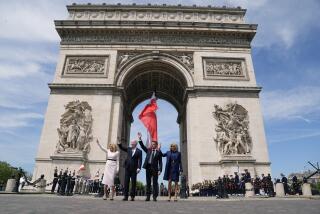French Boost Castro With Big Welcome : Politics: Cuban leader says Paris visit ends isolation. Mitterrand seen as defying United States.
- Share via
PARIS — Fidel Castro was treated to a trumpet-and-drum fanfare Monday at the French presidential palace, where he happily told President Francois Mitterrand over lunch that his first visit to France signaled the end of the “apartheid” imposed by the West on his island nation.
The Cuban president, one of the world’s last surviving Communist leaders, was embraced by many in France, where the Socialist president recently called the U.S. embargo of Cuba “stupid” and where Mitterrand’s wife is one of Castro’s biggest defenders.
The visit, Castro’s first to a major Western power, was vintage Mitterrand, who at age 78, ailing with cancer and facing the final two months of his 14 years in power, has been doing pretty much as he pleases.
Le Monde, the influential, left-leaning daily newspaper in Paris, viewed Mitterrand’s warm welcome of Castro as “a last act of defiance against the Americans.”
Castro arrived Monday morning from a U.N. poverty summit in Copenhagen in his traditional olive-green fatigues and headed straight for breakfast with the French first lady, Danielle Mitterrand.
Mrs. Mitterrand, a regular visitor to Cuba and defender of left-wing causes, told reporters that Castro was “not a dictator.” She praised what she called Castro’s “achievements in education and women’s rights.” Her remarks came just a few days after the U.N. Human Rights Commission censured Cuba for human rights violations.
Later Monday, Castro appeared in a dark suit to review Republican Guards at the presidential palace, where he and Francois Mitterrand shook hands and mugged for cameras. Over lunch there, Castro told Mitterrand: “This morning, touching French soil, I said to myself, ‘This is it. Apartheid is over.’ ”
Castro and Mitterrand, who have met only once before, are two of the world’s longest-serving leaders.
Castro, 68, took power in 1959. He has made only two other visits to Europe, both to Spain. Monday’s visit came at the invitation of UNESCO and was not officially a French state visit. But Castro and his entourage were put up at Marigny Hotel, a residence reserved for France’s most-honored guests.
Such was the fascination with Castro here that he was invited to meet conservative political leaders at the National Assembly. He will meet business leaders today in an effort to drum up foreign investment in Cuba.
In a fiery speech to UNESCO on Monday, Castro accused the United States of trying to dominate the world and called its embargo of Cuba a “criminal blockade” that victimizes children, women and the elderly.
At UNESCO, he was greeted by throngs of well-wishers chanting “Fidel” and waving Cuban flags. Several dozen protesters also gathered to criticize Cuba’s human rights record and demand the release of political prisoners.
Castro said the United States was applying a double standard to Cuba as punishment for the nation’s rebelliousness. “They trade with China and negotiate with North Korea for nuclear reactors,” he said. “But we cannot even import an aspirin from the United States or obtain medicine for cancer or tetanus.”
Such words went down easily in France, which shares Castro’s distrust of U.S. economic and political power.
Mitterrand and his wife have been determined to win more Western respect for Castro, who is seen by many Socialists in France as a well-meaning leader victimized by his feud with the United States. Under Mitterrand, France has increased trade with Cuba, which is in desperate need of aid since the collapse of its longtime ally, the Soviet Union. Mitterrand justified his decision to welcome Castro by saying it would encourage “real liberty” in Cuba.
Some, though, believe the inspiration behind the visit was Mitterrand’s wife. France-Libertes, the humanitarian group she oversees, recently dispensed more than $2 million in donations to Cuba.
There were others who expressed discomfort with Castro’s visit.
Alain Juppe, the French foreign minister whose conservative government shares power with Mitterrand, criticized the 34-year-old U.S. trade embargo against Cuba, saying it was the wrong way to achieve change. But he told a radio interviewer that Cuba still needed to make “progress toward democracy and respect for human rights.”
More to Read
Sign up for Essential California
The most important California stories and recommendations in your inbox every morning.
You may occasionally receive promotional content from the Los Angeles Times.













